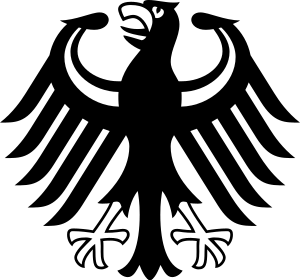Quick facts for kids
Federal Ministry of Finance
| Bundesministerium der Finanzen |
 |
| Agency overview |
| Formed |
1880 as the "Reichsschatzamt" |
| Jurisdiction |
Government of Germany |
| Headquarters |
Berlin |
| Minister responsible |
|
| Website |
bundesfinanzministerium.de |
The Federal Ministry of Finance (German: Bundesministerium der Finanzen), often called the BMF, is a very important part of the German government. It has offices in Berlin and Bonn. The person in charge is called the Minister of Finance. Their main office is in a building in Berlin called the Detlev-Rohwedder House. This building used to be the old Reich Air Ministry. The ministry also gets advice from a group of smart people called a scientific advisory board.
What the Ministry Does
The Ministry of Finance has a big job: it figures out how much money the German government can spend each year. It also decides how to get that money, mostly through taxes like income tax. Think of it like managing a giant household budget for the whole country!
To help with this, the ministry oversees a few other important groups:
- The Federal Forestry Commission, which manages government forests.
- The Federal Spirits Monopoly Administration, which used to control alcohol sales.
- The Federal Portfolio Management, which looks after government property and assets.
Who Has Been Minister of Finance?
Since 1949, many different people have served as the Minister of Finance for Germany. This table shows some of them. The minister's job is to manage the country's money, which is a huge responsibility!
| Ministers of Finance |
| No |
Name |
Life data |
Term start |
Term end |
Party |
| 1 |
Fritz Schäffer |
1888-1967 |
20 September 1949 |
29 October 1957 |
CSU |
| 2 |
Franz Etzel |
1902-1970 |
29 October 1957 |
14 November 1961 |
CDU |
| 3 |
Heinz Starke |
1911-2001 |
14 November 1961 |
19 November 1962 |
FDP |
| 4 |
Rolf Dahlgrün |
1908-1969 |
13 December 1962 |
28 October 1966 |
FDP |
| 5 |
Kurt Schmücker |
1919-1996 |
8 November 1966 |
30 November 1966 |
CDU |
| 6 |
Franz Josef Strauß |
1915-1988 |
2 December 1966 |
20 October 1969 |
CSU |
| 7 |
Alexander Möller |
1903-1985 |
22 October 1969 |
13 May 1971 |
SPD |
| 8 |
Karl Schiller |
1911-1994 |
13 May 1971 |
7 July 1972 |
SPD |
| 9 |
Helmut Schmidt |
1918-2015 |
7 July 1972 |
15 May 1974 |
SPD |
| 10 |
Hans Apel |
1932-2011 |
16 May 1974 |
15 February 1978 |
SPD |
| 11 |
Hans Matthöfer |
1925-2009 |
16 February 1978 |
28 April 1982 |
SPD |
| 12 |
Manfred Lahnstein |
1937- |
28 April 1982 |
4 October 1982 |
SPD |
| 13 |
Gerhard Stoltenberg |
1928-2001 |
4 October 1982 |
21 April 1989 |
CDU |
| 14 |
Theodor Waigel |
1939- |
21 April 1989 |
27 October 1998 |
CSU |
| 15 |
Oskar Lafontaine |
1943- |
27 October 1998 |
18 March 1999 |
SPD |
| 16 |
Hans Eichel |
1941- |
12 April 1999 |
22 November 2005 |
SPD |
| 17 |
Peer Steinbrück |
1947- |
22 November 2005 |
27 October 2009 |
SPD |
| 18 |
Wolfgang Schäuble |
1942- |
28 October 2009 |
incumbent |
CDU |
Between 1990 and 1993, a very important civil servant (a high-ranking government employee) named Horst Köhler worked at the ministry. He was from the CDU party. Later, in 2004, he became the Federal President, which is the head of state for Germany.






